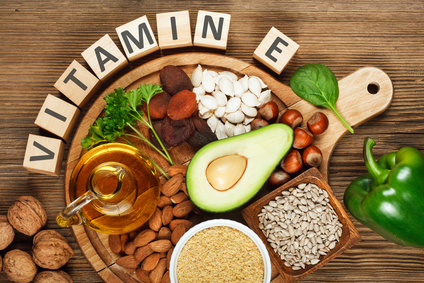Contents
Vitamin E and Arthritis
This article discusses the link between low vitamin E and arthritis.
Oxygen radicals are released as a result of joint inflammation. This damages cartilage and joint structure. In such an environment, the antioxidant defence is disturbed. As a result, cartilage damage can develop in arthritis patients.
In 2011, an Iranian research group examined the concentration of various antioxidants in the blood of people with rheumatoid arthritis1. They compared 59 patients with arthritis with 60 healthy volunteers. Vitamin E and carotene concentrations were determined in the serum by chromatography of the participants. Both antioxidant substances were statistically shown to decrease in the blood of patients with rheumatoid arthritis.
From this, the researchers concluded that a decrease in the amount of vitamin E and other antioxidant substances in the body can promote arthritis. This is supported by other studies that have found a link between vitamin D deficiency and arthritis.
 Vitamin E and Arthritis, Focus on Anti-inflammatory Properties
Vitamin E and Arthritis, Focus on Anti-inflammatory Properties
There is a growing interest in alternative methods for arthritis treatment using antioxidant substances. In 2012, Al-Okby published an extensive review of foods and their effects on arthritis2. Specifically, Al-Okby was interested in the concentration of inflammatory markers in the blood of patients with rheumatoid arthritis.
Al-Okby examined groups of substances such as tocopherol, phenolic compounds and polyunsaturated fatty acids. It was found that inflammatory reactions and associated makers could be reduced based on diet. This research supports the idea that antioxidant substances such as vitamin E might be suitable for the treatment of rheumatic diseases.
Combination Therapy
There have been studies investigating the effects of the vitamin in association with other compounds on arthritis symptoms. Animal studies on mice prone to rheumatoid arthritis have examined the effects on vitamin supplementation in association with omega-3 fatty acids3. Researchers have concluded that vitamin E may decrease pro-inflammatory cytokines and lipid mediators. However, further studies are necessary to determine optimal nutrient combinations to support healthy joints.
Summary
It has been shown that arthritis patients can benefit from increasing vitamin E intake. The antioxidant activity helps to reduce inflammation around the joints. This can assist with pain relief and improve joint mobility. However, patients can expect better results when taking the vitamin in combination with other compounds, such as omega-3 fatty acids, glucosamine sulphate and chondroitin sulfate.
Bibliography:
- Aryeian et al., 2011. Beta-carotene, vitamin E, MDA, glutathione reductase and aryl esterase activity levels in Patients with Active Rheumatoid Arthritis. Iranian J Publ Health 40 (2), 102-109 ↩
- Al-Okby. , 2012. Nutraceuticals of anti-inflammatory activity as complementary therapy for rheumatoid arthritis. Oct 26, doi: 10.1177/0748233712462468 ↩
- Tidow-Kebritchi & Mobarhan, 2001. Effects of diets containing fish oil and vitamin E on rheumatoid arthritis. Nutr Rev. Oct;59(10):335-8. ↩






